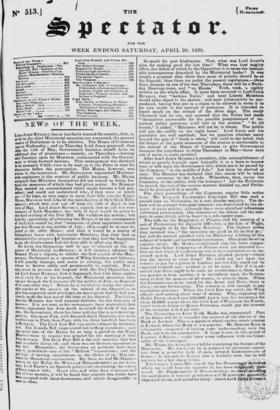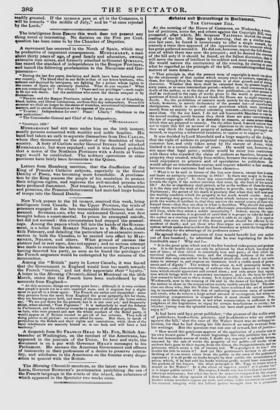NEWS OF THE WEEK.
Loan JOHN Busses,. has at last fairly warned the country, that, in is far as the chief Ministerial measures are concerned, the present session of Parliament is to be abortive. The House of Commons net on Wednesday ; and on Thursday Lord JOHN proposed, that after the 14th of May, Government business should have an sdditional day of precedence—namely, on Thursdays—leaving only Tuesdays open for Members unconnected with the Govern- ment to bring forward motions. This arrangement was declared to be necessary if bills were to be sent up to the Peers in time for discussion before the prorogation. The House, however, was averse to the concession. Mr. GOULBURN reproached Ministers with negligence in the conduct of public business. Mr. Hums intimated that Ministers themselves did not intend to bring for- ward the measures of which they had given notice. Sir ROBERT Pm. misted an encroachment which might become a bad pre- mdent; and could not understand why, if they were so much pre---ed for time, so very eager to carry their bills into the Upper Rouse, Ministers had delayed the introduction of their Irish Tithe measure, which TAM now put off from the 30th of April to the 14th of May. Lord JOHN RUSSELL replied, that to suit the con- venience of Irish Members. the 30th of April would be given to the third reading of the Poor Bill. He withdrew his motion; but took the opportunity of informing the House, that the consequence of its failure would be, that "measures of great importance would piss that House in the middle of July ; they would be at once re- jected in the other Hon-se ; and then it would be a matter of triumphant boast with honourable Members, that they had so obstructed the progress [of legislation that they had the happiness to say the Government had not been able to erect any thIng." No doubt, the Opposition will be apt to chuckle at the ex- posure of Ministerial inefficiency : it will certaiwy advance Sir ROBERT PEEL'S objects, to exhibit the first session of the Mas- i:men Parliament as a session of Whig blunders and failures ; it will greatly damage, and assist in ruining, the public men whom he desires safely and permanently to supplant. But it Hay occur to persons not leagued with the Tory Opposition, to ask Lord JOHN RUSSELL how it happened, that with three nights out of every five at his disposal, the Ministerial measures were not got through the Commons till the middle of July, or disposed of in some other way ? &hire he is entitled to charge the toi‘er- able results of the session on the refusal of the Opposition to give him unprecedented privileges, he must prove that he had pre- viously made the best use of the time at his disposal. The hurt is, that the Minister has had unusual facilities for the despatch of business. It is not true, as his newspapers have pretended, that thous opposition has done much to retard the work of the ses- sion. On the contrary, there has been nothing like a system:tin, op- POSiliiitle CHARLES Fox, with five-and-thirty lembers, was more troublesome to Pi, than PEEL with his three hundred has bvell toRusseLL. The Civil List Bill was carrie,I almost by aeclatna- lion. The Canada Bill experienced but trittieg resistance
the entire time of the House fin as long a peciod as the IV ilia :•1 Minister chose to require was greeted for the carrying of ilia, Tin Measure, The Irish Poor Bill is the only measure that has been carefully discus-ed ; and there was no factious 'opposition to that bill. Meanwhile, the discussions on petitions have been
Prohibited—one of the " Reform " innotatiuns ; nil the Prniistte of moving amendments on the Order of the DI cur- tithed for Ministerial convenience. But then, we had Mr.Gitors's motion on the Ballot, Sir WII.LIAM MOLESWoRTH'S on the Cetus flies, Lot 4 ELIOT'S on Spanish policy—all obstructing the course 5,00velument bills. Grunt this, and what does It amount to ? yut of four mend's, it will be found that scarcely two weeks have ken occupied with these diecussione, and others disagreeable to Men in office. So much for past hindrances. Now, what was Lord Jonres plan for making good the lost time? What was that mighty effort, the defeat of which by the Opposition is to cause the lametst.- able consequences described by the Ministerial leader ? It was simply a proposal that three days more of priority should be at his disposal, than there are under the present regulations,—three days, because on one of his four Thursdays, there will be a Birth- day Drawing-room, and " no House." Trick, trick, ia legibly written on the whole affair. It must have occurred to LordJoitg Russets. that "factious Tories" and busy Liberal Members would alike object to his motion : and most submissively he sur- rendered, having first put in a claim to be allowed to enter it to his own credit in the account of pretences. It is intended to found much on the refusal of the three days. The ready Chronicle had its cue, and asserted that the Tories had mad* " themselves answerable for the possible postponement of im- portant public questions until late in the session." " At all events," it added, " Ministers will not be to blame. The public will put the saddle on the right horse." Lord Jotted and bit journalist are well matched; but we question whether many beyond the pale of " black is white," will yield to tbe belief, that the failure of the great measures of the session is attributable to the refusal of the House of Commons to eve Government business the precedence in three Thursdays in May—three days out of seven or eight months !
After Lord JOHN RUSSELL'S prophecy, (the accomplishment of which so greatly depends upon himself,) it is a faros to bestow time or talk upon the Government bills which are to be passed by the Commons "in the middle of July? Let them be shelved at once. The Minister has declared that this course will be taken without ceremony by the Lords. Wherefore, then, annoy the Commons, or the public, with the trumpery ? Let the Estimates be passed, the rest of the routine matters doubled up, and Parlia- ment be prorogued in a month. The other proceedings of the Commons require little notice here. Mr. Sergeant TAcrotran's Cop right 'Bill was read a second time on 'Nednesday, by a very slender majority. The de- bate will be perused with some interest; not diminished by the ab- sence of party politics, although there were abundant indicatioua otliterary partisanship. Our remarks on the debate And the sub- ject, in some detail, will be found in a subsequent page. Two bills for the Regulation of Prisons, and the erection of a sort of Penitentiary for Juvenile Offenders in the Isle of Wight, were brought in by the Home Secretary. The highest praise they received was -" the measures are good as far as they go;" but nobody seemed satisfied with the Ministerial nibbling at this subject of urgent and increasing importance. One point deserves especial notice. Mr. Hewes complained that the main sugges- tions of the Select Committee on Prisons were not attended to— that no new place of confinement was to be constructed on an im- proved system. Lord JOHN RUSSELL pleaded poverty—where was the money to come from? He could not call upon the country to pay for a prison in London, and tee City could not be expected to build one: so there is to be none. But if it is ad- mitted that there ought to be such an establishment. then, from one quarter or from another, it is incumbent upon the Govern- ment to find the means—at all events, to propose them. When the'Estiniates are to be voted for the Army and Navy, there is always money forthcoming. The country is rich enough to pay scandalous pensions. When the Civil List was voted, the Whig officials said nothing about want of money. Why, supposing the Model Prison should cost 250,000/. (nut a very low estimate,) the extra 10.00U/. a year abut'', the Civil List of WILLIAM the Fourth, voted without demur to Queen VICTORIA, would pay the interest of the intestine a at 4 per cent. The Committee no Joint Stock Banks was reappointed. Part of its duties will be to cousider the renewal of the chaster of the Bank ot Ireland. This is a cmestion which excites much interest in Ireland, where the Bank is not popular. Mr. SPRING RICK is ‘Pheinently suspected 41 having some understanding with the Bank, not wall the commuult.y. A large bonus, in this period of fleaucial el, ficienct, might have some influence with the Chan- cellor of the exchequer. Mr. W ARD has brought in a bill far regulating the Sewers of the Metropolis. We tout that he is prepurt.4I for strenuous opposi- tam from a Reseal,' hotly of men, ycleped Commissioliers of Sewers: Ile has put his Rogers into a hornet's nest, but he will not cure tor a few shai p stings.
The :mints Courts Bill, ono of the few Govern which we ceuld litmesils approve of, has been ire potted. M1'. PACK1NGTON t1 Woicesterehile, no (144
the sentiments sit country gentlemen and M igistra igeuerally,; - expressed olden), and asked fur delay : which Lord gusuitt. . .4
readily granted. If the measure pass at all in the Comnions, it will be towards " the middle of July," and be "at once rejected by the Lords."



























 Previous page
Previous page